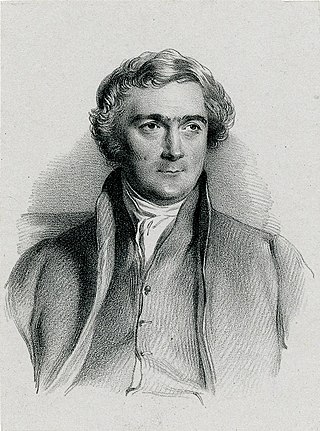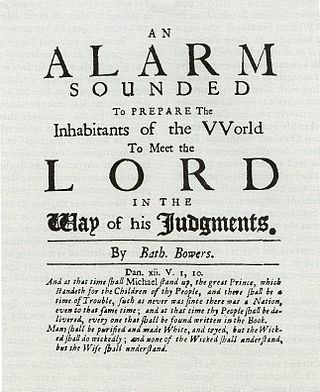Related Research Articles

Robert Barclay was a Scottish Quaker, one of the most eminent writers belonging to the Religious Society of Friends and a member of the Clan Barclay. He was a son of Col. David Barclay, Laird of Urie, and his wife, Lady Katherine Barclay. Although he himself never lived there, Barclay was titular governor of the East Jersey colony in North America through most of the 1680s.

Edward Montagu, 2nd Earl of Manchester, KG, KB, FRS was an important commander of Parliamentary forces in the First English Civil War, and for a time Oliver Cromwell's superior.

Mary Dyer was an English and colonial American Puritan turned Quaker who was hanged in Boston, Massachusetts Bay Colony, for repeatedly defying a Puritan law banning Quakers from the colony. She is one of the four executed Quakers known as the Boston martyrs.

Anthony Benezet, born Antoine Bénézet, was a French-American abolitionist and educator who was active in Philadelphia, Pennsylvania. One of the early American abolitionists, Benezet founded one of the world's first anti-slavery societies, the Society for the Relief of Free Negroes Unlawfully Held in Bondage ; the first public school for girls in North America; and the Negro School at Philadelphia, which operated into the nineteenth century. He was a vegetarian and advocated for the kind treatment of animals, integrating this in his teachings.

Joseph John Gurney was a banker in Norwich, England and a member of the Gurney family of that city. He became an evangelical minister of the Religious Society of Friends (Quakers), whose views and actions led, ultimately, to a schism among American Quakers.

Swine is a village and civil parish in the East Riding of Yorkshire, England. It is situated approximately 5 miles (8 km) north-east of Hull city centre and 2 miles (3.2 km) south of Skirlaugh to the west of the A165 road.
The Boston martyrs is the name given in Quaker tradition to the three English members of the Society of Friends, Marmaduke Stephenson, William Robinson and Mary Dyer, and to the Barbadian Friend William Leddra, who were condemned to death and executed by public hanging for their religious beliefs under the legislature of the Massachusetts Bay Colony in 1659, 1660 and 1661. Several other Friends lay under sentence of death at Boston in the same period, but had their punishments commuted to that of being whipped out of the colony from town to town.
Richard Hubberthorne was an early Quaker preacher and writer active in the 1650s and early 1660s until his death in Newgate prison.
Alexander Parker was a Quaker preacher and author.
William Dewsbury was an English Quaker minister and religious writer in the early period of the movement. He was born in Allerthorpe, Yorkshire, around 1621. Little is known of his parents or education, except that his father died when he was eight years old.
Martin Mason was an early English Quaker, often imprisoned for his beliefs, and a prolific writer of controversial tracts.
Matthew Caffyn was a British General Baptist preacher and writer.
Humphrey Wollrich (1633–1707) was an English Quaker writer born in 1633.
Dorothy White was an English Quaker and writer of religious pamphlets. These give useful information on Quaker beliefs at that time, for instance, in relation to the Inner Light.

Bathsheba Bowers was an American Quaker author and preacher. Her only surviving work is the spiritual autobiography An Alarm Sounded to Prepare the Inhabitants of the World to Meet the Lord in the Way of His Judgments (1709).
Eleanor Davies (1590–1652) was a prolific English writer and prophet, publishing almost seventy pamphlets during her lifetime.
Katherine Evans (1618–1692) and Sarah Cheevers (1608–1664) were English Quaker activists who were held captive during the Roman Inquisition in Malta, between December 1658 and August 1663. During and after their captivity, Evans and Cheevers published several books that were critical of the Catholic Church and the Spanish Inquisition and promoted their own Quaker beliefs.
Sarah Blackborow was the English author of religious tracts, which strongly influenced Quaker thinking on social problems and the theological position of women. She was one of several prominent female activists in the early decades of the Society of Friends, notable also for originating a scheme to distribute aid to London prisoners.
Alice Curwen was an English Quaker missionary, who wrote an autobiography published along with correspondence as part of A Relation of the Labour, Travail and Suffering of that Faithful Servant of the Lord, Alice Curwen (1680). Her maiden name and parentage are unknown. She came from Baycliff in the Furness district of Lancashire, and spent part of her life as a missionary and social activist in New England and the Caribbean.
Thomas Camm (1640/41–1708) was an English Quaker minister and writer. He was imprisoned for not paying tithes in 1674; fined for unlicensed preaching in 1678; and imprisoned, probably for preaching, from 1680 to 1686. He published religious tracts.
References
- 1 2 3 "Gargill, Anne (b. c. 1625, d. in or after 1659), Quaker and writer | Oxford Dictionary of National Biography" . Oxford Dictionary of National Biography (online ed.). Oxford University Press. 2004. doi:10.1093/ref:odnb/64775 . Retrieved 21 April 2019.(Subscription or UK public library membership required.)
- ↑ Gargill, Anne (September 2008). A warning to all the vvorld by Anne Gargill.
- ↑ "A brief discovery of that which is called the popish religion with a word to the Inquisition discovering their seat of injustice and cruelty, and also a word to them who are in bondage under this deceit that upholdeth the Beasts worship. And a word to the Pope who calls himself a bishop and is not, his throne of deceit is discovered, by the Spirit of the eternall God. / Given forth by me who am called of the world. A. Gargill". quod.lib.umich.edu.